-
IN WATER 물안에서 (Hong Sang-soo 2023)
HONG SANG-SOO: IN WATER 물안에서 (2023)

Hong's second film for 2023, 61 mibutes, and intentionally out of focus. A young filmmaker prepares to shoot at an off-season island retreat. Debuted at Berlin.
Last edited by Chris Knipp; 09-24-2023 at 08:52 PM.
-
RADU JUDE: DO NOT EXPECT TOO MUCH FROM THE END OF THE WORLD (2023)

Another tirade from he Rumanian author of the timely and entertaining but scattershot filmmaaker of Bad Luck Banging or Loony Porn (2021). (Locarno.)
Last edited by Chris Knipp; 09-18-2024 at 06:35 AM.
-
CLOSE YOUR EYES/CERRAR LOS OJOS (Victor Erice 2023)
VICTOR ERICE: CLOSE YOUR EYES/CERRAR LOS OJOS (2023)
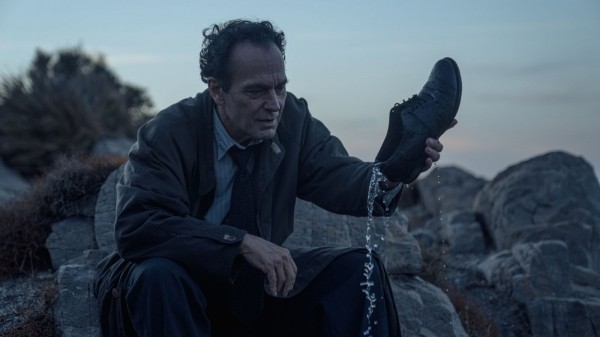
MANOLO SOLO IN CLOSE YOUR EYES
Worlds within worlds; a brilliant late interrogation of memory and cinema
Cerrar los ojos begins with a scene that's deceptive: set in 1947 Paris, it's really a long segment of a film called The Farewell Gaze/La mirada del adiós that was never finished, because its lead actor (Jose Coronado) disappeared. And it's a scene where a big bearded man wearing a turban that's almost a crown - and he refers to "the sad king" and the chess piece of the white king: he's a kind of giant chess piece himself - asks this man to find his lost daughter, who must be 14 now. When the film itself begins it focuses on the search for this lost actor.
So a film within a film with a search within a search. At the end, twenty years later, the director of the unfinished film (Manolo Solo) goes to find the lost actor. The two men were friends. In their youth, they joined the navy together: there is an old photograph in their uniforms, in their "silly hats." The director appears on a TV show about the "lost actor", and when the show appears, someone calls in who recognizes the actor. He is in an "asilo" where she works. The film ends with the director's moving into the "asilo" and attempting to reawaken his lost actor friend's apparently long paralyzed memory. Amnesia seems to have been the cause of his disappearance; or perhaps he disappeared and then got amnesia, we don't know the order of events.
The character in the clip who was sent to find someone "disappears," that is, the actor does. And then he is found. Is the last part of the film real? What is clear is that this work by the noted Spanish filmmaker, member of a generation that included Carlos Saura, itself on the verge of disappearing, represents Erice's first feature film in three decades. What has he been doing? Has he been lost? He does have an unfinished film: there are autobiographical elments in this new, completed one.
Certainly Victor Erice has not lost the gift for resonant cinema he showed in his few earlier notable works - El Sur (1983), The Spirit of the Beehive (1973) and Dream of Light (1992). And in the closing sequence of this film he also focuses on and cherishes cinema. (As pointed out by Jordan Mintzer in his admiring <a href="https://www.hollywoodreporter.com/movies/movie-reviews/close-your-eyes-review-victor-erice-1235498587/">Hollywood Reporter</a> review, Erice's films have always included strong references to "cinema’s powers to captivate and transform," and those are very much present here too.) The early part of the director-investigator's process involves meeting with a librarian of old celluloid film - including the unfinished one. When the actor is found, this custodian is summoned to play the unfinished film in an old cinema near the "asilo." There are a few people in the audience including the lost actor, the director, the TV interviewer, the lost actor's daughter, and others.
This is a specific story, though it is as symbolic and resonant as, say, a short story by Jorge Luis Borges. The whole film is filled with a meditative, sweetly melancholy quality that is very beautiful. Erice moves at his own studied pace. Arguably the early sequences, when the whole situation is being set up, are slow and unnecessarily lengthy; but there may be riches in the Spanish dialogue that elude this reviewer. There is no doubt that the whole builds to a delicate, thought-provoking conclusion. Sadly, this film may be a little too quiet for theatrical audiences. But it will remain as a treat for fans of Spanish cinema, evidently a final, late-arriving cap on the limited but distinguished career of a director who, at 83, may not have another film, since thirty years from now he won't be around.
Close Your Eyes/Cerrar los ojos, 169 mins., premiered at Cannes in its Cannes Première section May 22; also shown at Toronto, San Sebastián, Taiwan and BFI London. Screened for this review as part of the New York Film Festival, where it is shown Oct. 4, 2023. Opened at Film Forum Aug. 23, 2024, coming to California in Sept. Metacritic rating: 86%. (Now risen to 88%, Aug. 2024)
Last edited by Chris Knipp; 08-21-2024 at 01:13 PM.
-
KIDNAPPED/RAPITO (Marco Bellocchio 2023)
MARCO BELLOCCHIO: KIDNAPED/RAPITO (2023)
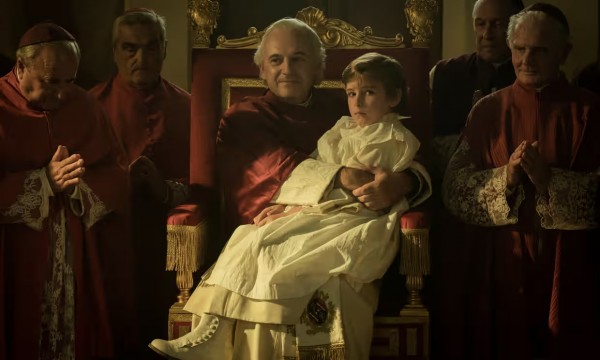
PAOLO PIEROBON AND ENEA SALA IN RAPITO
Bellocchio recounts a true incident when a Jewish child was kidnapped by the Vatican in the 1850's and converted to Christianity. Cannes in competition.
In 1858, in the Jewish quarter of Bologna, the Pope’s soldiers burst into the home of the Mortara family (who appear to be wealthy; and there are seven children). By order of the cardinal, they have come to take Edgardo, their seven-year-old son. He turns out to be secretly baptized by his nurse as a baby and the papal law is unquestionable: he must receive a Catholic education - except whether the Vatican can seize the boy at this age is dubious.
Controlled chaos reigns in these early scenes. The Catholic officials coming first to inform Mortara, making it seem like there is danger, but there can be delays. Then the sudden seizure of Edogardo, the innocent boy.
Edgardo’s parents will do anything to get their son back - but they make one big mistake: they fail to work through the Jewish community of Rome, whose ghetto is the oldest in Europe and one of the largest. This angers the Roman Jews, who in turn anger the Pope.
This incident is almost too good to be true, and Bellocchio makes a spectacular, operatic explosion of images and story out of it that has been called one of his best films - made when he is in his early eighties now.
Bellocchio is one of the great Italian directors since the early sixtes, when he became famous with Pugni intasca/Fists in the Pocket (1965) and China Is Near/La Cina è vicina (1967). He is still making major films half a century later, including the 2019 The Traitor/Il traditore (2019), starring Pierfancesco Favino, about the major witness against the mafia, which was very important in Italy and featured in the 2019 New York Film Festival.
Bellocchio has almost made himself the director of kidnappings, with two memorable examinations of the most notable such event in modern Italian history, the Aldo Moro kidnapping: Good Morning, Night/Buongiorno notte (2003) telling the story from the kidnappers' viewpoint, and a recent TV series treatment in Exterior, Night (2022), where multiple other points of view are represented.
Kidnapped highlights the boy (Enea Sala as a child; Leonardo Maltese as Edgardo in his twenties). But Bellocchio moves around to other viewpoints, frequently focusing on Salomone Mortara, the boy's father (Fausto Russo Alesi) or his aggrieved mother (Barbara Ronchi). Most notably he focuses on the perpetrator of all this, Pio Nono - Pope Pius IX (Paolo Pierobon), who seems sometimes an ogre, sometimes a buffoon, sometimes a fading dictator frantically trying to maintain power. The film is bold in its unflattering depiction of the Catholic Church and bends toward Jewish family liturgy in an unusual way for an Italian film.
The surprise twist of the story of course is that the boy, both bright and cooperative, goes from making the best of his new life in the uniform of the papal school with its flashy big white bow to outright enjoying his new life because he is smart, has a prodigious memory, and becomes the best student. Jesuit teaching may be intensely doctrinaire, arguably brainwashing, bit it is famously full of intellectual stimulation, a magnet for fine minds. Edgardo's "calvary" comes to seem rather like being suddenly sent off to a posh boarding school, with a guaranteed secure future with options of upward mobility: Edgardo will grow up to become a novice for the priesthood in the bosom of the Vatican itself.
Meanwhile the boy's father continues to struggle to oppose this situation, and it is made clear at one point that Edgardo remains distantly ambivalent toward the Pope and never stops missing the warmth of his big family, the rituals of Hebrew chanted en famille morning and night. (Too bad the English subtitles don't indicate what language they're translating, when they go from Italian, to Yiddish, to Hebrew, and to Latin: but this is not the fault of the Italian film.)
As usual with Bellocchio the film is full of chiaroscuro red and black eye candy: it is gloriously visual. A great deal of its operatic style is also due to the grand, surging score by Fabio Massimo Capogrosso.
This was a lengthy time of turbulence in Italy's Risorgimento (1848–1871) whose details will tend to elude all but Italian viewers, since the war between the waning Vatican and secular forces located elsewhere will be unknown to most non-Italians. To fully understand the background of Kidnapped we need to know about that, and the film does provide at least quick background notes with frequent onscreen titles (in big red letters). Is the Pope operating outside the law? we may ask. But the answer has to be "whose law?" since things were not to be sorted out until later.
Rapito is like a string of arias, whose flow never stops till the end. It's a wonderfully satisfying film, not afraid to be conventional - obviously best enjoyed on the big screen in a theater with a good sound system, like that of the Walter Reade Theater at Lincoln Center, where it was presented for the press of the New York Film Festival. To be shown to the public Oct. 3 and Oct. 8 with a Q&A with Bellocchio Oct. 8. Some critics have raved, but the general response has been lukewarm: Jessica Kiang in Variety calls it "just a little too tradition-bound for its own good."
Kidnapped/Rapito, 134 mins., debuted in competition at Cannes May 23, 2023. Also shown at Toronto, Vancouver, BFI London and numerous other festivals including New York, as part of which it was screened for this review. Metacritic rating: 68%.
US release May 24, 2024.
Last edited by Chris Knipp; 05-16-2024 at 12:09 AM.
-
THE SETTLERS/LOS COLONOS (Felipe Galvez 2023)
FELIPE GALVEZ: THE SETTLERS/LOS COLONOS (2023)

Massacre of indigenous tribes at the hands of Spanish landowners in in 1901
The vast area of Tierra del Fuego is owned by wealthy rancher José Menendez (the great, and busy, Alfredo Castro). Under Menendez's authority three men – Scottish army captain MacLennan (Mark Stanley), American mercenary Bill (Benjamin Westfall) and young mestizo tracker Segundo (Camilo Arancibia) ride out through the land with the zsskin a safe route to the coast. Given free rein, the men embark on a wild killer rampage, persecuting and slaughtering the indigenous Selk’nam people.
Galvez' Cannes prizewinner may fall short as narrative, where it is fragmentary, but it is stunning filmmaking, using square format and closeups and percussive sound to shock us with the ugly violence of early white invasion of Chile and neighboring regions. Wendy Ide calls this film "savage if tonally uneven" in her Screen Daily review; but that is the point: the total disconnect between one minute and the next, in depicting a world in which morality and logic are missing; where there are no rules so atrocities prevail, and they're only a faint memory back in the capital.
This film relates to Lucrecia Martel’s Zama (2017) and Lisandro Alonso’s Jauja (2014), audacious and influential recent depicting the brutality of colonialism in an offbeat way.
The Settlers/Los colonos. 97 mins., debuted in Certain Regard at Cannes, receiving the FIPRESCI Prize, the first Chilean production to do so. Screened for this review as part of the New York Film Festival. OCT. 2 & 4, Q&As with Galvez.
Limited US release in Jan. 2024 has been announced by Cinema Tropical.
Last edited by Chris Knipp; 01-03-2024 at 03:18 PM.
-
MAY DECEMBER (Todd Haynes 2023)
TODD HAYNES: MAY DECEMBER (2023)
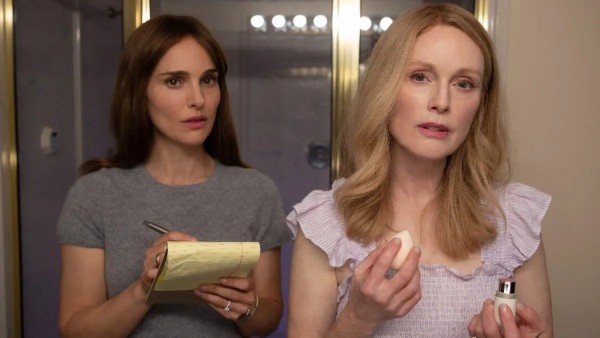
NATALIE PORTMAN, JULIANNE MOORE IN MAY DECEMBER
Seamy, steamy, funny scandal-dredging
Haynes' layered drama, which has been called his warmest and most accessible, consciously has things in common with Ingmar Bergman's Persona, where a nurse (Bibi Anderson) and her mute famous actress patient (Liv Ullman) find themselves converging. We've got two similarly famous actresses mirror-converged here, sometimes consciously posed on-screen à la Bergman: they are Julienne Moore and Natalie Portman, who are seen sharing makeup methods, mirrors, and stares into each other's eyes. This movie offers Oscar prospects for both Moore and Portman, because both get a chance to chew up a lot of scenery and both have juicy, borderline lurid roles. The film seems rather a mixed bag, very watchable certainly, but so complex and multi-directional it leaves little clear impression, better perhaps in post-watching analysis than in the viewing - though such analysis may reveal lacunae or anomalies.
The creepy-weirdo element here not found in Persona (apart from Bergman's usual highly wrought emotional intensity) is the central tabloid source, May December being loosely based on the story of Mary Kay Letourneau, the Seattle teacher who went to jail for having sex with a 12-year-old boy and subsequently had two daughters by him and married him.
In Todd Haynes' film, actress Elizabeth Berry (Portman), known for a popular TV series called "Norah’s Ark," is going to be in a film about a woman made famous by tabloid romance, played by Moore; and comes to stay with Gracie Atherton-Yoo (Moore) and her family; Gracie hopes this new film will tell her story better than a crude version published back in the day. (The movie doesn't reveal the background story all at once, letting it out bit by bit.) The seventh-grader Gracie had sex with at 14 and later married (as we eventually learn) is now 33 and known as Joe (Charles Melton). Their various children (it's hard keeping track of them) are grown, but around. Elizabeth bakes cakes. What does Joe do? Much of the attention is on Portman's character, though Gracie may seem to be just as much a star, of the tabloid kind. It is hard not to think frequently of both women in the film primarily just as actresses. (But that's fun, to be sure.) There is something very campy about this glossy cinematic bringing together of two prima donnas. This is another of Haynes' gay films, one of the gayest.
Hayes goes for a hothouse atmosphere ripe for love from the start with lots of hazy cinematography, implying actual heat, sometimes perhaps merely air pollution, with the action set in Savannah, Georgia in a big house that makes you think of a cotton plantation. Where the Atherton-Yoo family would get the dough for their comfortable lifestyle is unclear. Maybe there is family money somewhere; maybe the tabloid scandal proved lucrative.
There is a musical theme, and it's a powerful reworking of Michel Legrand's score for The Go-Between. Joe raises Monarch butterflies, and early images are of fuzzy germination and flight. (The film was originally to be set in Camden, Maine; the switch must have changed the tone. The original cinematographer was to be Edward Lachman, changed to Christopher Blauvelt due to a Lachman health problem, and this must have changed things too.)
The scene is set well. The action is a mixture of elements that perhaps intentionally clash. Gracie seems hysterical, and may not have much of a life. She has a prolonged crying jag, comforted by Joe, when one of her pastry clients cancels her business. There are Gracie's kids by Joe, and older ones by her first husband. Joe, a handsome hunk with impressive cheekbones and bee-sting lips and an ethnic look (Melton, a former model and "Riverdale" actor, is part Caucasian American, part Korean, part Cherokee). He simply is, also is interviewed by Elizabeth, comforts Gracie, and flirts with someone in daily text message exchanges. In one memorable scene he's out on a roof and seems for a moment likely to fall off.
The presence of Elizabeth upsets whatever apple carts there are in this complicated hothouse. We may wonder if she herself may be a bit off to take on such a role as this. She is seen being inappropriately detailed in talking about how to do sex scenes to a junior high acting class. Checking out online candidates to play the boy her character will seduce or be seduced by - in a late exchange Gracie reminds Joe "You seduced me - Elizabeth says the boy actors aren't "sexy enough." She flirts more and more with Joe.
We don't always know how we are to take matters or how they are being taken; not always exactly sure where the funny melds into the icky, or when the fraught fades into the mundane. Haynes and his writer Samy Burch choose not to have a single overt interpretation or moral position on central events of this story. Some of us might prefer a film that did have that, but the fascination, even if the matter gets blurred, is that this way they keep it complicated, so one doesn't know where things are going from one scene to the next. The many layered, however, may get confused with the blurry, as signalled by the opening shots.
May December , 113 mins., debuted at Cannes May 2023. It is included in dozens of other festivals, including the NYFF, where it was the Opening Night film Sept. 29. Opening theatrically in the US Nov. 17, 2023. Metacritic rating: 8̶3̶%̶ 85% (upgraded DEc. 2023).
Last edited by Chris Knipp; 12-20-2023 at 12:30 AM.
-
POOR THINGS (Yorgos Lanthimos 2023)
YORGOS LANTHIMOS: POOR THINGS (2023)
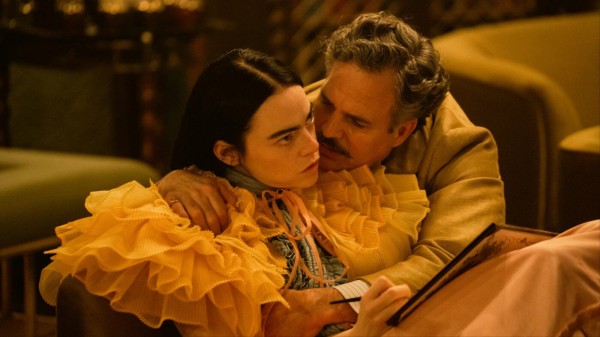
EMMA STONE AND MARK RUFFALO IN POOR THINGS
Bawdy, supremely visual period genre exploration of human possibility, and triumph for Emma Stone
Lanthimos' latest film, the big winner at the Venice Film Festival, is a sort of bonkers reworking of the Frankenstein myth with a female re-creation. This is even more of a critical success than its predecessor, The Favourite, maybe not more of a popular success. It's more offensive to common taste and values than the latter. But it demands attention and delights the eye with its beautiful and distinctive mise-en-scène and use of locations, and it lives and breathes though an adept and go-for-broke performance by Emma Stone in the lead role. It's ultimately wearying, too much of a good, or delightfully bad, thing, but it has a "look" that never falters in being impressively consistent throughout. Lanthimos has grown in skill and appeal from film to film and this is a peak, a fluent and bold tour de force that astonishes and delights as much as it offends and provides a gloriously visual realization of an interesting tale.
Everything is set in the nineteenth century when there were carriages: one of them early on is memorably drawn by a what is only the stuffed head of a horse, one of many signals that everything is a little bit off-kilter. This is a time, it is assumed, when science and medicine are at liberty to play wildly with nature. Hence a well-off woman drops off a bridge and drowns and Willem Dafoe's doctor-surgeon Dr. Godwin Baxter, with a heavily scarred face (an elaborate feat of prosthetics and makeup) and a seemingly plausible Scottish accent (perhaps an homage to the late Alastair Gray on whose book this film is based) reanimates the drowned lady's body with the help of a lot of electricity together with surgical insertion of a fresh baby's brain. Voilà! A mature woman with long raven tresses and the unformed mind and undeveloped motor skills of a child.
What follows is a sort of around the world in a crazy eighty days during which Bella Baxter, as the doctor has named his creation - and he has her call him "God" - grows with astonishing rapidity from a rude, balletic non-person who spits out food, boxes people and babies in the face, and is as dependent and worshiping toward him as an Irish setter to its master, to a lady who reads books and thinks and manipulates men as she likes.
The panache with which Emma Stone performs in this role is a delight, beginning with her inventive and original choreography of a body learning to balance and move. A lot of Lanthimos' action however, and often The writing attributed to Alasdair Gray and The Favourite coscriptor Tony McNamara, is as much gratuitously crude and silly at times as it is bold. The childish provocations sometimes distract from what might be possible insights.
And yet we should begin with the settings and look, which in turn begin with the use of a fisheye lens that rounds and expands everything, whether interior or exterior, providing a quaint, painterly, and quite beautiful look, sometimes in black and white, more often in color.
Meanwhile Bella's development is largely framed around sex. She discovers early the delights of self-pleasure, and couples with one man who uses, and then repentantly loves, her, Duncan Wedderburn (Mark Ruffalo, whose posh English accent is tongue-in-cheek), and another man, a student of the doctor, who reveres and is betrothed to her, Max McCandless (Ramy Youssef). Bella is a free woman though, and even her experiences of a Parisian brothel - elaborately realized, including a memorable interior seen from above, is an energetic, cooly intellectual exploration of possibilities, and way of making money.
Lanthimos has graduated from "dour, deadpan little tales," as Stephanie Zacharek puts it in her understandably admiring Time review, that show how wicked men can could be as if we needed to know, to things that are "more wickedly cheerful and bawdy." This may still be seen as a mixed blessing, except that he has also simply grown enormously as a filmmaker along with the opening up of mood. Poor Things is more challenging as a project and frankly magnificent - you can call it show-offy if you like - than anything he has done before. Movies are about visuals, after all; this film is very much that, and also has a plot. It could have done with less vulgarity, tempered its violence, and edited out twenty to thirty unnecessary or repetitive minutes. But one no longer cringes at the prospect but instead now anticipates with pleasure what Lanthimos will do next.
A standout of the year and Oscar-worthy in many categories, as pointed out by YouTube's "The Oscar Expert," "brother bro," and a female Lanthimos fan guest in their Oct. 18, 2023 review. It now may rank with and even exceed Oppenheimer in awards season.
Poor Things,141 mins., debuted at Venice Sept. 1, 2023, where it won the Golden Lion for best film. It was subsequently scheduled for a great many international festivals, including the NYFF, where it was screened for this review and shown Sept. 30, 2023. Metacritic rating: 9̶4̶%̶ - now 87%.
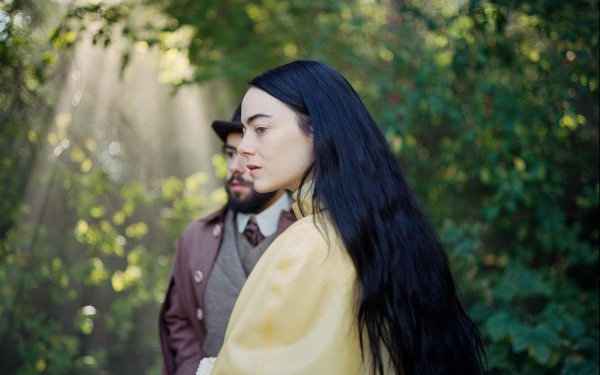
EMMA STONE IN POOR THINGS
Last edited by Chris Knipp; 02-02-2024 at 11:44 PM.
-
LA PRÁTICA (Martín Rejtman 2023)
MARTÍN REITMAN: LA PRÁTICA (2023)

ESTEBAN BIGLIARDI IN LA PRÁTICA
Called a "leading light of the New Argentine Cinema," Martín Rejtman is back here with his first film in nine years (following Two Shots Fired, NYFF/2014), "a shrewd deadpan comedy that provides further evidence that few directors are as adept at dramatizing the absurdity of the mundane. Gustavo (Esteban Bigliardi), an Argentinean yoga instructor living in Chile, has recently separated from his wife. . ." runs the festival blurb.
Two Shots Fired, however, seemed to me at the tme "first flat, then absurdist, finally simply pointless," and seemed "like some inexplicable instructional film or the work of a deranged amateur," though I received the impression from various reviews of other Reijman films that his absurdist method sometimes really worked, at least for some.
Last edited by Chris Knipp; 09-25-2023 at 12:28 PM.
-
ORLANDO, MY POLITICAL BIOGRAPHY (Paul B. Preciado)
PAUL B. PRECIADO: ORLANDO, MY POLITICAL BIOGRAPHY (2023)
 ]
]
ONE OF 27 ORLANDOS IN ORLANDO
Embracing Woolf's sex-changing history as a bible of trans lore
Preciado, a writer and philosopher, opens with narration about how Virginia Woolf's novel "Orlando" – where an English poet lives over centuries and, at one point, changes genders from male to female – doubles as his own biography. Since Woolf wrote his biography before he was born, Preciado decided to construct his directorial debut as a correspondence to Woolf after her death. He recruits 27 trans and non-binary people, including himself, to play the eponymous role while talking about their own lives. The revolving door of subjects allows Preciado to use an episodic structure that lets him change things up on a scene-to-scene basis.
Preciado says Virginia Woolf's Orlando is his biography, and takes this famous work of English fiction as a kind of bible of trans life. The film doesn't go very deeply into Woolf's book; it's the idea of it that counts for Preciado. Viewers of this film, which is in French, with one extended speech in Spanish, will remember it as a procession of different young and old (but mostly young) trans people who announce themselves as appearing in the film to play the role of Orlando, and donning a big ruff collar - a feature of seventeenth-century dress worn, notably, by both men and women - as symbolic "costume" for their. . . audition?
They don't tell much about themselves, either. But what is striking is the merry procession of trans people, some with light voices, some with deep voices, taling about their lives, the wonder of hormones and injections and changes they are for the most part happy about.
The imortant thing is that this is a happy and even celebratory film that trans people can identify with and rejoince in.
Last edited by Chris Knipp; 09-24-2023 at 05:09 PM.
-
THE BOY AND THE HERON (Hayao Miyazaki 2023)
HAYAO MIYAZAKI: THE BOY AND THE HERON (2023)

GENERAL FILM FORUM REVIEW
The celebrated Studio Ghibli auteur or "anime maestro" signs his last animated film. More self-identified than his more usually girl-centric tales, this one focuses on Mahito, a 12-year-old misfit, and the gray heron he discovers flapping about his new home - a bird that turns into a little bald gnome-like creature with a red bulbous nose and big teeth. Peter Debruge in his Variety review assesses this as "a worthy but mid-range addition" to the Miyazaki oeuvre.
Last edited by Chris Knipp; 12-16-2023 at 11:15 PM.
 Posting Permissions
Posting Permissions
- You may not post new threads
- You may not post replies
- You may not post attachments
- You may not edit your posts
-
Forum Rules

]
Bookmarks